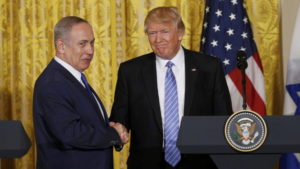By Benjamin Grove || Layout Assistant

In the past few years, U.S.-Israeli relations have been heightened, especially due to ongoing war between the Palestinian and Israeli people. This has affected international relations. The tension between the United States and Israel is something that many people want to see weakened because the two nations have a lot to offer one another, specifically in strengthening trade relations. Such tension has arisen between the two nations because of the Israeli-Palestinian conflict, which has caused presidents for the past two decades to urge the declaration of two independent states—Israel and Palestine. However, Israel has yet to agree with that notion and the majority of its people want to remain as one state.
To discuss the relationship between their respective countries, President Donald Trump and Prime Minister Benjamin Netanyahu met on Wednesday, February 15th. Both heads-of-state look forward to and desire “the renewal of ties after eight years of perceived mutual loathing under President Barack Obama,” said Ian Lee and James Masters of CNN in an article. Per numerous acknowledgements by PM Netanyahu, Obama’s departure and Trump’s arrival are good news for Israel.
Netanyahu’s excitement for better relations between his country and America continued through the press conference. However, PM Netanyahu did not agree with everything Trump had to say. The biggest take-away from their meeting was that President Trump declared “that the United States would no longer insist on the creation of a Palestinian state,” which it has done in the past, according to the New York Times. Trump then later urged the PM to put a halt on housing construction in an area in Palestine, seemingly contradicting his earlier statement, but this seemed to be a less important matter to the Prime Minister. Netanyahu is instead focused on the conflict with his political party, which primarily believes in the two-state nation. Meanwhile, Trump said that, looking at one-state vs two-state, he “like[s] the one that both parties like,” which is the one-state system. This assertion could affect Israel-U.S. relations in the future.
Another topic of their conversation was Iran. According to both Trump and Netanyahu, Iran is a threat to the safety of not only Israel, but to the rest of the world. Both parties are concerned by the nuclear weapon-building in Iran and want the Iran Deal to be replaced with a stronger alternative. A CNN article states that “Trump faces a conundrum whereby European allies want the deal to remain in place, while Israel wants a harder line.”
On the topic of the U.S. embassy, which some want moved from Tel Aviv to Jerusalem, Netanyahu encourages the move and even goes as far as stating that all embassies should be moved to Jerusalem, whereas Trump is uncertain where he stands on the issue. President Trump believes that moving the American embassy to Jerusalem will show peace, and his popularity is rising among the Arab leaders, but he is still considering the move.
The last major topic of the leaders’ meeting was Syria. Both the PM and Trump believe that happiness and safety are important for the people of Syria, but Trump calls for a “safe zone” in Syria and Netanyahu is compelled to help “mitigate some of that suffering.” Both parties understand the crisis of the Syrian Civil War, but neither seemed to be overwhelmingly concerned.
Looking at the conference between the U.S. President and Israel’s Prime Minister, it is evident that the relations between the two countries will become stronger during Trump’s presidency, and important deals will be made.
First-year Benjamin Grove is a Layout Assistant. His email is bgrove@fandm.edu.
